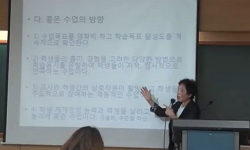The objective of this study was to analyze the research trends in action learning in Korea over the past 20 years to gain insight into the current state of research in this field and to suggest potential avenues for future action learning research. Th...
http://chineseinput.net/에서 pinyin(병음)방식으로 중국어를 변환할 수 있습니다.
변환된 중국어를 복사하여 사용하시면 됩니다.
- 中文 을 입력하시려면 zhongwen을 입력하시고 space를누르시면됩니다.
- 北京 을 입력하시려면 beijing을 입력하시고 space를 누르시면 됩니다.

액션러닝(Action Learning) 연구 동향 분석: 국내 학술지 문헌을 중심으로 = An Analysis of the Research Trends in Action Learning in South Korea
한글로보기https://www.riss.kr/link?id=A109275818
- 저자
- 발행기관
- 학술지명
- 권호사항
-
발행연도
2024
-
작성언어
Korean
- 주제어
-
등재정보
KCI등재
-
자료형태
학술저널
-
수록면
1-29(29쪽)
- DOI식별코드
- 제공처
-
0
상세조회 -
0
다운로드
부가정보
다국어 초록 (Multilingual Abstract)
Subsequently, the years of publication, research methodology, field of study, and research purposes were investigated. Additionally, the research subjects and outcome factors of the action learning were analyzed. The field of action learning in Korea has a relatively short history of academic research, commencing in 2001. However, following the keynote lecture delivered by action learning researcher Michael Marquardt at the HRD Society in 2004 and the subsequent establishment of the Korea Action Learning Association in 2005, there has been a notable resurgence of interest in this area of study. Initially, numerous studies on research methods were conducted to introduce the concept of action learning through literature research and to explore the applicability of action learning to other fields. However, over time, there has been a shift in focus toward studies that analyzed program development, application, and effectiveness. The advent of action learning initially occurred within the context of corporate training and education, subsequently being applied to the domain of higher education. The researchers confirmed that studies utilizing action learning as a methodology outnumber those focused on theoretical research of action learning. Additionally, there has been an increase in studies applying and verifying the effectiveness of action learning programs, and many studies have explored the potential applicability of action learning to various fields. Most of the research participants were college and graduate students, and an active research program in higher education was also underway. The results indicated that action learning had a positive impact on several key performance indicators. At the individual level, it enhanced problem-solving capabilities and fostered self-directed learning. At the organizational level, it improved job performance, and communication and collaboration within teams. Considering the findings, further research is warranted to advance the theoretical understanding of action learning. It is recommended that modeling studies be conducted to examine the competencies of learning coaches in applying action learning to diverse fields and contexts, with the aim of enhancing the competencies of action learning instructors.
The objective of this study was to analyze the research trends in action learning in Korea over the past 20 years to gain insight into the current state of research in this field and to suggest potential avenues for future action learning research. This study analyzed action learning papers listed as KCI in the Research Information Service (RISS) and the Korean Citation Index (KCI).
Subsequently, the years of publication, research methodology, field of study, and research purposes were investigated. Additionally, the research subjects and outcome factors of the action learning were analyzed. The field of action learning in Korea has a relatively short history of academic research, commencing in 2001. However, following the keynote lecture delivered by action learning researcher Michael Marquardt at the HRD Society in 2004 and the subsequent establishment of the Korea Action Learning Association in 2005, there has been a notable resurgence of interest in this area of study. Initially, numerous studies on research methods were conducted to introduce the concept of action learning through literature research and to explore the applicability of action learning to other fields. However, over time, there has been a shift in focus toward studies that analyzed program development, application, and effectiveness. The advent of action learning initially occurred within the context of corporate training and education, subsequently being applied to the domain of higher education. The researchers confirmed that studies utilizing action learning as a methodology outnumber those focused on theoretical research of action learning. Additionally, there has been an increase in studies applying and verifying the effectiveness of action learning programs, and many studies have explored the potential applicability of action learning to various fields. Most of the research participants were college and graduate students, and an active research program in higher education was also underway. The results indicated that action learning had a positive impact on several key performance indicators. At the individual level, it enhanced problem-solving capabilities and fostered self-directed learning. At the organizational level, it improved job performance, and communication and collaboration within teams. Considering the findings, further research is warranted to advance the theoretical understanding of action learning. It is recommended that modeling studies be conducted to examine the competencies of learning coaches in applying action learning to diverse fields and contexts, with the aim of enhancing the competencies of action learning instructors.
동일학술지(권/호) 다른 논문
-
2015 및 2022 개정 공통 교육과정에 나타난 디지털 시민성 관련 성취기준 분석
- 이화여자대학교 교육과학연구소
- 도지민
- 2024
- KCI등재
-
난민 모티브 이야기를 활용한 면담으로 알아본 유아의 평화개념
- 이화여자대학교 교육과학연구소
- 김지은
- 2024
- KCI등재
-
전문상담교사가 인식한 경계선 지능 중학생의 사회ㆍ정서적 특성 및 학교 적응을 위한 상담 활동: 합의적 질적 연구
- 이화여자대학교 교육과학연구소
- 장문선
- 2024
- KCI등재
-
공립유치원 교사의 업무량과 업무가동률 분석에 대한 교사의 인식 및 지원방안 탐색
- 이화여자대학교 교육과학연구소
- 김경숙
- 2024
- KCI등재




 RISS
RISS DBpia
DBpia





